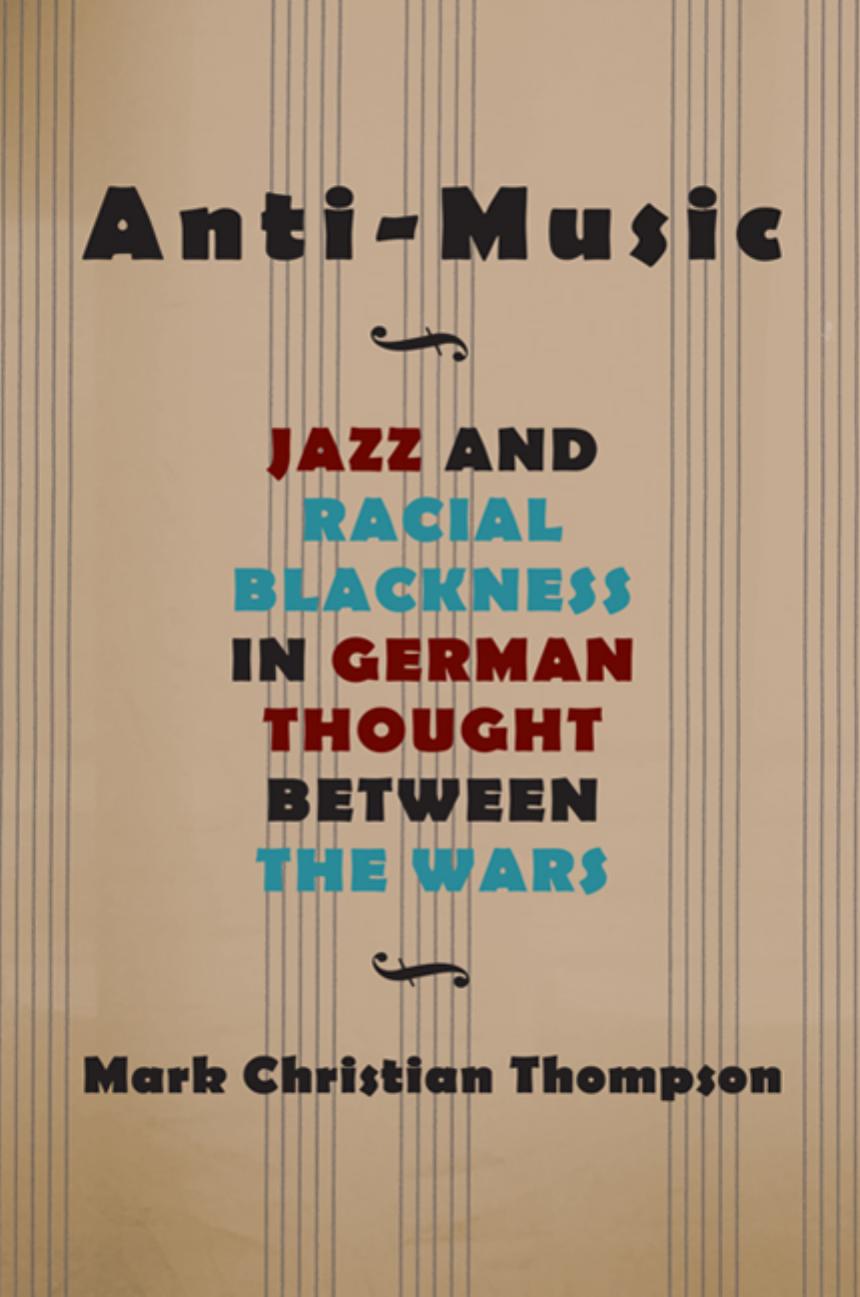Anti-Music by Mark Christian Thompson

Author:Mark Christian Thompson
Language: eng
Format: epub, pdf
Publisher: State University of New York Press
Published: 2018-04-14T16:00:00+00:00
I. JAZZ AT WAR
The first obstacle to the historical consideration of jazz in the present is that the music’s origin has been lost in the fog of war. Indeed, jazz’s contemporaneity as a postwar phenomenon obscures its immediate effects. What is known of jazz’s origin is that it gave rise to the music’s contemporary and historical expressions only after World War I, as its German variant. Adorno’s interwar and immediate postwar jazz “genealogy” depends largely on the history of jazz in Germany, as practiced by Germans. As Robinson again reminds us, when approaching these essays, we must “transfer his remarks to the commercial music of Weimar Germany, where jazz … followed a completely different line of development. Confronted with a music played by whites, heard, purchased and danced to by whites, and mass-produced and marketed by whites, Adorno may be excused for concluding that any black American features that may have existed in jazz had been utterly eradicated in the course of its social evolution” (Robinson 13–14). While the interest here is neither in condemning nor excusing the racial aspects of Adorno’s jazz essays, Robinson’s more specific historical point is of crucial importance for understanding Adorno’s work on jazz. Adorno separates black jazz from white, African American from German, and in so doing he clearly understands that the German variant can be used to totalitarian ends. In Adorno, as in Germany at the time, there is not one unified sense of jazz and jazz history, there are two: one African American and one German. Adorno speaks exclusively to the latter.
To accept, however provisionally, Adorno’s genealogy of German jazz, or jazz as it has been commodified by the culture industry in Germany, one must recognize to whom this jazz belongs, which is also to ascertain for whom this jazz exists (Brown 24–29). In situating jazz’s first appearance, its Urauffuhrung on the German cultural scene as coterminous with the singularity of a specific jazz program, Adorno defines German jazz in its totality from the point of view of a single, hegemonic perspective, separate from jazz’s African American variant. The jazz of which Adorno speaks is that of a strictly German origin from within the culture industry. Thus, Adorno positions the beginnings of jazz in a European framework. Although he mentions African American expressive culture’s role in the formation of jazz, this turns out to reinforce the historical-origin narrative of jazz in Germany. Adorno does this to undermine the potential Aryan mythologization of jazz as a German music form. It is also why he insists that jazz does not come into being, Athena-like, just after World War I as an African American expressive form but is instead a German invention with its roots in the war itself.
Adorno is fully aware that the potential for fascism’s appropriation of German jazz rests on the very hierarchical, discursive logic fascists use to generate and condition belief in jazz as the product of a racially inferior culture. In removing African America from jazz history, Adorno seeks to critique fascism’s claims to jazz without offering a corrective.
Download
This site does not store any files on its server. We only index and link to content provided by other sites. Please contact the content providers to delete copyright contents if any and email us, we'll remove relevant links or contents immediately.
The Goal (Off-Campus #4) by Elle Kennedy(13639)
Kathy Andrews Collection by Kathy Andrews(11793)
Diary of a Player by Brad Paisley(7537)
What Does This Button Do? by Bruce Dickinson(6185)
Assassin’s Fate by Robin Hobb(6183)
Big Little Lies by Liane Moriarty(5768)
Altered Sensations by David Pantalony(5085)
Pale Blue Dot by Carl Sagan(4981)
Sticky Fingers by Joe Hagan(4167)
The Death of the Heart by Elizabeth Bowen(3593)
The Heroin Diaries by Nikki Sixx(3532)
Beneath These Shadows by Meghan March(3287)
Confessions of a Video Vixen by Karrine Steffans(3287)
How Music Works by David Byrne(3245)
The Help by Kathryn Stockett(3129)
Jam by Jam (epub)(3066)
Harry Potter 4 - Harry Potter and The Goblet of Fire by J.K.Rowling(3041)
Computational Linguistics and Intelligent Text Processing: 20th International Conference, CICLing 2019 La Rochelle, France, April 7â13, 2019 Revised Selected Papers, Part I by Alexander Gelbukh(2974)
Strange Fascination: David Bowie: The Definitive Story by David Buckley(2848)
